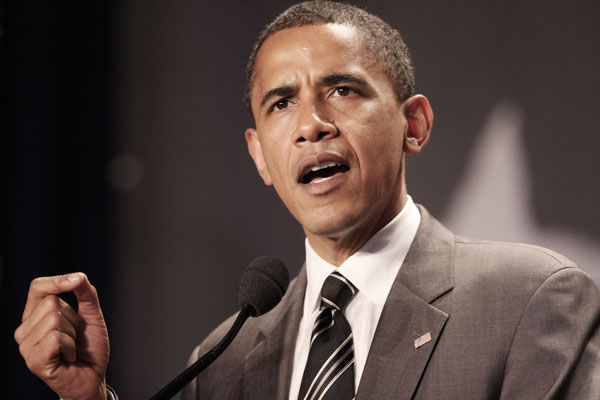Can Obama’s Energy Plan Satisfy Progressive Voters?
Jul 31, 202018K Shares948.5K Views
Sen. Barack Obama (campaign photo)
This is the first part of a two-part series on energy. Part 2 will focus on the GOP.
With a housing market in shambles, unemployment on the riseand increased talk aboutrecession, the economy is a top concern for voters in the rapidly approaching presidential election. Among the many economic woes facing Americans, the high price of gasoline is among the most daunting — especially for the middle and working classes, which are being hit the hardest.
As the polling gap between Sens. John McCain and Barack Obama tightens, voters across the political spectrum want to know which candidate will better address energy issues.
Illustration by: Matt Mahurin
Many Democrats and progressive independents say that Obama has what it takes to address energy issues head on. But some progressives fear his policies are too centrist for their taste, and environment advocates express doubts he can meet their standards. On the campaign trail, his vocal support of nuclear energy, “clean” coal technologies and now offshore drilling have raised red flags for some Americans who identify as liberal.
When it comes to energy, Obama may be a man with a plan, but is it the right plan for progressive voters?
The League of Conservation Voters, a watchdog environmental group, says yes. Josh McNeil, the group’s spokesman, says progressives want what Obama keeps talking about: change. “Progressive voters — and all voters — are looking for a real change in the way we use energy in this country,” said McNeil. That means moving away from oil and toward solar and wind, he says.
McNeil says his conservation-minded voters see Obama as showing a “real commitment to energy efficiency, improving fuel economy in our cars and making massive investments in wind, solar and geothermal — the types of energy that will create real energy independence and protect our planet.”
Voters are also concerned about high gas prices. A major worry among progressives, says McNeil, is that oil companies may be benefiting at the expense of working-class Americans. Those voters seem to trust that Obama will address their concerns. “His plan makes a lot of sense,” McNeil said. “Exxon made the highest profits of any company in the history of the world this year. Obama has proposed to take some of those profits and give them back to consumers; and use some of those to invest in [alternative energies]. That’s an immediate solution. It directly helps consumers.”
But there are areas in which progressives are split. One that’s been the focus of much attention on the campaign trail is offshore drilling. Though many progressive voters adamantly oppose drilling, more Democratic and independent voters are starting to support it. A pollby Rasmussen Reports finds that about 37 percent of likely Obama voters support offshore drilling — versus 90 percent of likely McCain voters.
Obama, too, has said he is open to drilling as part of a larger energy package — in a move some labeleda “flip-flop.”
But there are other liberal groups who back Obama despite his new-found support of offshore drilling. Michael Huttner, the executive director of Progress Now, the largest online progressive organization in Colorado, speaking of those who call Obama out on this, insists that this is a case of Democrats and progressives getting it wrong, not Obama selling out.
“Ultimately, it’s up to the progressive movement and organizations to give [Obama] the sort of leverage he needs so he doesn’t have to compromise too much,” said Huttner. Since progressives aren’t doing that, he said, Obama is being pressured to cave to a poor policy decision. “I think putting our eggs in the offshore drilling basket is a mistake,” he said. “Offshore drilling is very limited in how it can change the market.”
Younger progressives constitute one group that clearly places emphasis on other kinds of energy exploration. Young voters are talking about developing alternative energy sources and promoting energy conservation, says Alexandra Acker, the executive director of Young Democrats of America, an activist political group for those under age 36. “Exploration in the form of alternative energy is where young people are focused,” Acker said, “wanting more innovation, wanting to incentivize, figuring out how we can harness solar energy in the Southwest and wind energy in the Northeast.” She says the group sees Obama is the candidate who plans to address those issues.
Like any other group, young voters are highly concerned about gas prices. Acker says that young progressives believe Obama will take on one major source of energy cost woes: the oil companies. “Some people,” she said, “are really disgusted by tax credits for oil companies and the potential price gouging that we’re seeing going on right now with fuel costs. I think they want to end ‘politics as usual.’ Barack Obama certainly is the candidate they believe can do that.”
While young progressives see both Obama and McCain as improvements to the current administration, says Acker, they point out that they don’t believe McCain has the solutions to help reduce U.S. dependence on foreign oil. “It’s hard not to have a candidate who could be better on these issues than George Bush — who was such a disaster,” said Acker. “But, I don’t think John McCain is going to bring about the changes young people want when it comes to really dramatically looking at our energy system…He’s just so tied to special interests that he’s not going to want to give up our dependence on oil.”
It’s not just young people who feel that way, says Huttner of Progress Now. He points out that many progressives feel that McCain just doesn’t intend to help the country get off foreign oil. So even though they might not agree with Obama on every component of his environmental record, Huttner says, they agree with him more than McCain.
“There’s a fundamental difference in the direction between Sen. Obama and Sen. McCain in what their end goals are,” said Huttner. “I think Sen. Obama’s end goal — even though it’s not going to happen overnight — is to free us from dependence on foreign oil…That comes about through alternative energy. Some day we hope we’re reporting to Big Solar instead of Sen. McCain’s buddies and Big Oil.”
Yet, not all progressives are confident that Obama has taken a strong enough position on energy issues in his time as senator. Nor are they confident that he will take the lead on energy issues if elected president.
Another Denver-based group, the non-partisan Colorado Progressive Coalition, says this is true of voter perceptions of both presidential candidates. “Comprehensive work and real thoughtful work is still forthcoming from the Congress and the presidency,” said Carlos Valverde, the group’s co-executive director, “It’s something we’re still waiting for.”
But that is likely to soon change, Valverde said. “Whichever candidate is elected, energy will be a major priority for the administration,” he said. “[Action on energy] is something we’re still waiting for. There’s a full plate of items that these candidates are going to need to address in the first 100 days of the presidency…and it’s going to be hard to prioritize where energy sits.”

Hajra Shannon
Reviewer
Latest Articles
Popular Articles

